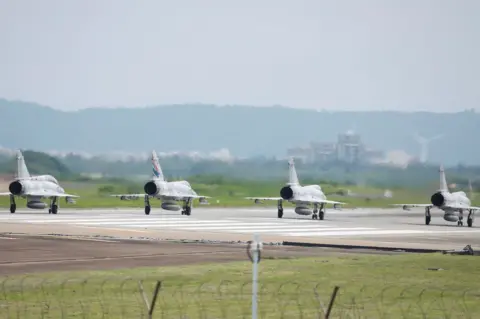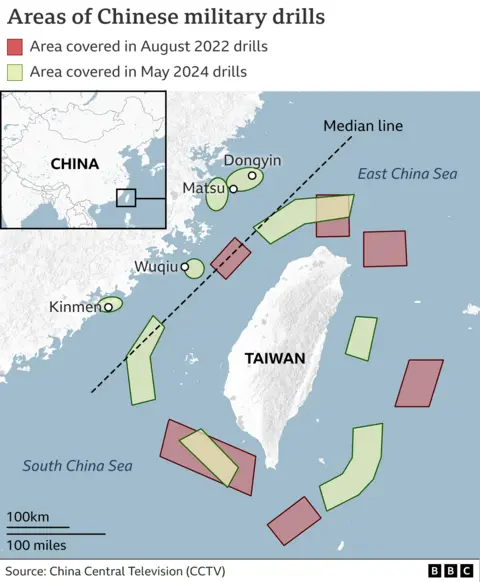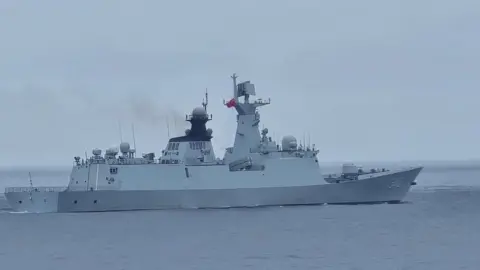5 hours ago
Rupert Wingfield-Hayes,BBC News, Taipei
 Reuters
Reuters
Taiwan Air Force jets prepare to take off in response to China’s drills
Soon after China began its military drills in the skies and seas around Taiwan, it also launched a tirade against the man they said had triggered it: William Lai, the island’s new president.
From the state broadcaster CCTV and the editorial pages of the Global Times, to the foreign ministry spokesperson, the chorus of condemnation of President Lai has been unequivocally acerbic.
The Global Times had already cast him as “arrogant” and “reckless”, and CCTV wrote that he “will certainly be nailed to the pillar of shame in history” and lambasted him for “selling the two-nation theory”. It also warned that if Mr Lai and his Democratic Progressive Party (DPP) “persist in their doomed path of Taiwan independence they will ultimately crash and burn”.
President Lai’s alleged crime is that in his inauguration speech on Monday he used the word China to describe China, Beijing says that in doing so Mr Lai revealed his true thinking that Taiwan is not China, and they are two different countries. It is, in their eyes, an admission of his “separatist” ideology.
To outsiders this may all sound absurd. But for decades Beijing and Taipei have obfuscated on their definitions of China, and whether Taiwan is part of it. Even former president Tsai was careful to refer to China in euphemistic terms like “the other side of the strait” or “the Beijing authorities”.
Some scholars in Taiwan will tell you such language is important, and that Mr Lai has crossed a dangerous line. Others say Beijing’s loathing for him was already set in stone and his speech has merely offered a rhetorical justification for the latest round of intimidation.
Most agree it doesn’t change the basic fact that Xi Jinping wants China to control Taiwan, and the people of Taiwan emphatically do not.


But no-one in Taiwan is particularly surprised. To them, the Chinese Communist Party (CCP) is rather predictable. When Mr Lai’s DPP won a third consecutive presidential election here in early January, many wondered how and when Beijing would respond.
The obvious assumption was that it would be after Mr Lai’s term was inaugurated with his first presidential address. So here we are, three days after President Lai’s inauguration, and Beijing has issued a response.
The main clue that none of this is spontaneous is in the preparation. No military, not even the People’s Liberation Army (PLA), can mobilise a drill on this scale in a matter of days. It’s hard to tell exactly what is going on, but from what Beijing has made public, the areas covered by these drills are perhaps the biggest we’ve seen yet, and include much of the Taiwan Strait, the Bashi Channel (which separates Taiwan from the Philippines) and large swathes of the Pacific along Taiwan’s east coast.
Also noticeable is the inclusion for the first time of Taiwan’s scattered outlying islands close to the Chinese coast. The PLA has marked them as being “encircled” by Chinese forces. On CCTV, Chinese military pundit Zhang Chi said the drills demonstrated the PLA’s “ability to seize control of Taiwan’s key infrastructure”.

 Taiwan Coast Guard
Taiwan Coast Guard
A Chinese warship navigates on waters near Pengjia Islet in northern Taiwan on 23 May
The drills look like a simulation of a full-scale attack on the island, minus the actual landing of troops, Taiwan military expert Chieh Chung says. He thinks the inclusion of all of Taiwan’s off-shore islands demonstrates China’s plan to eliminate facilities that could launch a counter-attack against the PLA. He also thinks this two-day drill will not be the last Taiwan will have to endure this year – hence the name “Joint Sword 2024-A”.
On the streets of Taipei the response to the drills has been a collective shrug. Many will tell you they are not worried. But that is not quite true. Living next to China is like living in an earthquake zone. The threat is always there and the drills are getting bigger and more dangerous, so you need to be prepared for it. But you also need to get on with your life.
Despite rancorous relations between Taiwan’s ruling DPP and the opposition – they were brawling in parliament last week – the Chinese drills have brought all the parties together. The opposition KMT, which is traditionally seen as being pro-China, has called for Beijing to show restraint. This is not the time when they want to be seen as being friendly to Beijing.
There is a strange irony here – one that shows how little China’s communist leaders understand Taiwan and its people.
Today, they declared that the military operations are focused solely on “deterring and defeating independence forces”.
They said Mr Lai was the worst of them all – the Taiwanese leaders who had challenged Beijing. “Lai has surpassed Lee Teng-hui, Chen Shui-bian and Tsai Ing-wen in promoting independence for Taiwan,” a commentary on CCTV reads. These former presidents, voted in by the Taiwanese people, make up China’s pantheon of “separatists”. Three of them are from the DPP.
Every time China turns up the military intimidation, support for the DPP tends to rise, and that for the “China-friendly” KMT falls. A more recent case in point: months of military incursions in the lead-up to January’s election put Mr Lai in the top job.
If the aim is to frighten the people of Taiwan into turning away from parties and leaders who challenge Beijing, so far it seems to be having the opposite effect.
Source link: https://www.bbc.com/news/articles/cd11n49enz2o

